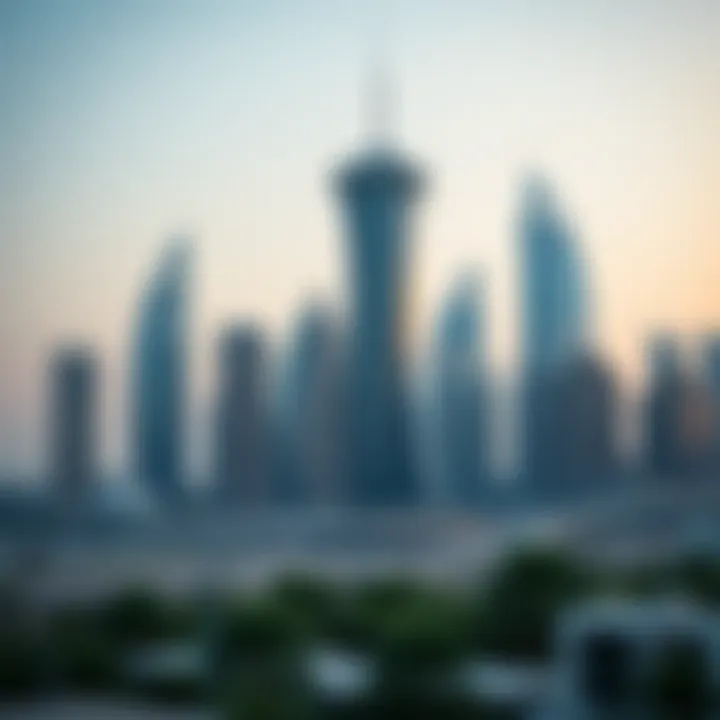Exploring Costs in Dubai: Real Estate Insights


Intro
Dubai is often seen as a vibrant hub of economic activity, commercial opportunity, and lavish living. But while the glitz and glamor are undeniable, understanding the intricacies of the cost landscape is paramount for anyone wishing to invest, buy a home, or even establish a business in this emirate. The reality is that the cost of living and doing business in Dubai can catch even the sharpest minds off guard. To navigate this multifaceted environment, one must delve into both current trends and deeper economic factors.
This article will explore the various elements that contribute to the cost dynamics in Dubai, focusing particularly on the real estate market, one of the most influential sectors in the area. From residential needs to commercial investments, we'll equip you with the insights necessary to make informed decisions. Expect to uncover detailed analyses of pricing trends, as well as the influences shaping future costs. We'll also touch on critical factors that anyone looking to engage with the Dubai market should take into account.
It’s crucial to grasp how market trends evolve, which types of properties can yield the best returns, and how living expenses stack up against expectations. Pulling back the curtain on the real estate landscape will allow investors, homeowners, and industry professionals alike to better understand what to anticipate as they venture into the exciting yet complex terrain of Dubai's marketplace.
Overview of Costs in Dubai
Living and investing in Dubai can be an alluring prospect, but understanding the cost landscape is pivotal for anyone considering these endeavors. Getting a grip on the expenses associated with this vibrant city equips investors, homebuyers, agents, analysts, and developers with essential insights.
The dynamic pricing environment in Dubai is influenced by a myriad of factors that can make or break the decision to purchase property or relocate. Grasping these elements not only aids in effective budgeting but also in formulating strategies that align with market trends. This section aims to lay the groundwork for a thorough understanding of costs, serving as a springboard for the more detailed analyses to follow.
Prelude to the Cost Landscape
Dubai is often portrayed as a playground for the wealthy, but it's a complex city where costs can vary significantly. The cost of living, real estate prices, and everyday expenses require careful examination. Visitors and residents alike need to navigate this intricate web of expenses, making it crucial to comprehend the fundamental elements that shape the city's economic environment.
A deeper insight into costs reveals various layers; for instance, the distinction between luxury and modest standards of living can drastically alter one's financial expectations. Key considerations include scrolling through utility bills that can fluctuate based on usage or evaluating transport options from driving personal vehicles versus utilizing public transport systems. The choices made here can gravely influence monthly expenditure, and a well-informed person can shape their lifestyle in accordance with their financial aspirations.
In addition, the cultural context plays a significant role in shaping expectations. Expats, in particular, have unique requirements, and understanding how these relate to local costs can lead to better planning and resource allocation.
Economic Factors Influencing Costs
A number of economic factors play into the cost landscape of Dubai, some interlinked in ways that may not be immediately apparent. Here are a few of the primary contributors:
- Inflation Rates: The ongoing rise in prices does not spare Dubai, leading costs to outpace wages in certain sectors.
- Economic Diversification: Unlike before, traditional industries like oil are now joined by tourism, finance, and real estate, influencing expenditure in various regions of the city.
- Regulatory Environment: Government policies on housing, labor, and trade can dramatically shift what residents and investors spend.
- Foreign Exchange Rates: Since Dubai attracts international residents, fluctuations in currency values can mean significant differences in pricing based on the country of origin.
These factors exemplify the need for continuous monitoring of the economic landscape.
Understanding Dubai's cost, not only enriches the decision-making process but also opens doors for investment opportunities that might go unnoticed without a thorough cost analysis.
This understanding sets the stage for a deeper dive into specific costs associated with real estate, rental dynamics, and living expenses in the subsequent sections.
Real Estate Pricing in Dubai
Understanding the real estate pricing in Dubai is a crucial part of navigating the city’s cost landscape. For those interested in buying, renting, or investing, grasping the financial commitments tied to real estate can save time and prevent costly mistakes. Real estate pricing isn’t just about the numbers; it reflects the heartbeat of Dubai's economic ambitions and serves as a barometer for global investor confidence. Navigating through the layers of this pricing structure will allow prospective buyers and investors to make informed decisions about where to put their hard-earned money.
Analysis of Property Prices
Recent Trends
Examining recent trends in property prices reveals a dynamic market that has shown resilience even in the face of global economic shifts. In the past few years, many areas in Dubai are on an upward trajectory, signalling not just growth, but also an increasing demand for real estate. The remarkable characteristic here is the sustained interest from both local and international investors.
One unique feature of this trend is the shift towards integrated developments that offer both residential and commercial spaces. These developments are attractive because they promise a higher return on investment, given their multi-functionality. However, it’s worth noting that rapid price increases can sometimes lead to volatility, which may be detrimental for investors looking for long-term stability.
Price Variability by Area
When delving into price variability by area, Dubai’s property market reveals stark differences across neighborhoods. Prime locations such as Dubai Marina and Downtown Dubai command sky-high prices, while areas like Jumeirah Village Circle offer a more affordable alternative.
This price variability is beneficial for a diverse group of buyers and investors, as it opens up options for different budgets. For instance, investors keen on luxury may prefer properties in upscale locales, while those seeking a foothold in the market without breaking the bank might look elsewhere. But one should tread carefully; choosing a less desirable area could lead to challenges in profitability down the road.
Types of Properties and Their Costs
Luxury Residences
Luxury residences represent the pinnacle of the Dubai real estate market. Typically located in prestigious neighborhoods and equipped with top-of-the-line amenities, these properties are not merely homes; they are status symbols. The key characteristic of luxury residences is their unparalleled quality, often featuring bespoke designs and unique architectural styles.
Such properties can command premium prices, which can be prohibitive for some buyers. However, the allure of luxury living often justifies these investments, as properties in desirable locations tend to appreciate well over time.
Affordable Housing
On the opposite end of the spectrum lies affordable housing, which aims to cater to the city's diverse population, including young professionals and families. Affordable housing projects usually offer streamlined spaces with basic but necessary amenities. Their key characteristic is accessibility, designed to accommodate varying financial situations.
This type of housing is gaining traction as demand grows for reasonably priced living options amidst rising costs. However, the downside is that oftentimes, these developments may not offer the same investment potential as higher-end properties, as their appreciation rates can be slower.
Commercial Properties
Commercial properties are an essential aspect of Dubai's real estate landscape, catering to businesses from startups to multinational corporations. The attractiveness of commercial real estate lies in its potential returns, which can be significantly higher than residential options. The key characteristic of commercial properties is their multifaceted nature, serving as essential hubs for economic activity.
The main advantage of investing in commercial property is the prospect of long-term leases with established businesses, leading to stable cash flow. However, investors should also be cautious, as the commercial market can be impacted by economic downturns and changing market demands.
In summary, understanding the intricacies of real estate pricing, including recent trends, area variabilities, and types of properties available, is crucial for anyone looking to navigate the complex landscape of Dubai's real estate market. Investors and potential home buyers must weigh their options carefully, as the decisions they make today can significantly impact their financial futures.


Rental Market Dynamics
The rental market in Dubai is a key aspect of its cost landscape. Understanding this dynamic helps investors and homebuyers navigate their choices effectively. In a city famed for its rapid growth and luxurious lifestyle, the rental market fluctuates based on a variety of internal and external factors. As more people flock to Dubai, driven by work opportunities and lifestyle aspirations, understanding the nuances of rental dynamics becomes essential for strategic decision-making.
Average Rental Prices
When exploring Dubai’s rental market, average prices serve as an important benchmark. The typical monthly rent can vary widely, reflective of location, property type, and market conditions. As of recent reports, the average price for a one-bedroom apartment in central areas like Downtown Dubai or Dubai Marina hovers around AED 6,500 to AED 10,000.
Conversely, prices in more suburban areas tend to be more affordable, with average rents for similar units priced between AED 3,500 and AED 5,500. However, it’s critical to note that fluctuations can occur based on seasonality, economic climate, and the influx of new expatriates. The data suggests that even a small change in demand can substantially shift rental values in certain regions.
Factors Affecting Rental Costs
Location
Location is perhaps the most significant driver of rental prices in Dubai. Areas like Dubai Marina are often sought-after due to their proximity to key amenities and picturesque views. Living in such coveted locales means higher rental prices, but it ensures easy access to vibrant lifestyle options, including cafes, shopping, and entertainment.
A unique feature of the location-based pricing in Dubai is how its geographic layout impacts accessibility in day-to-day living. For instance, properties near the Dubai Metro tend to attract renters willing to pay a premium for the convenience of public transport, significantly easing their daily commute. However, properties situated in emerging areas may offer larger spaces at lower rents, appealing to those who are more price-sensitive.
Amenities
Amenities play a defining role in shaping rental costs. Properties that provide luxurious amenities like swimming pools, gyms, and parking facilities generally command higher rents. In Dubai, where lifestyles are often characterized by leisure and convenience, having on-site facilities can significantly enhance one’s living experience.
Consider a property with a communal garden or a rooftop terrace. Such perks not only improve the property’s appeal but also its marketability. It’s worth noting that while such features may raise rental prices, they also create a more desirable living environment — attracting quality tenants who value comfort and luxury.
Market Demand
Market demand is the heartbeat of the rental landscape. The general trend has shown an increase in demand for rental properties, driven by the influx of expatriates and a growing population. Investors typically analyze market demand to forecast rental yields; high demand often leads to higher rental prices and lower vacancy rates.
As certain industries, such as technology or tourism, see growth in their workforce, the ripple effect furthers rental price increases in nearby residential areas. This demand creates competition among renters, sometimes pushing them to compromise on other factors like location or amenities.
"In a booming market like Dubai, understanding rental dynamics isn't just about numbers — it's about grasping the intricate fabric of lifestyle and location."
Navigating Dubai's rental pricing isn't a straightforward task, but by considering location, amenities, and market demand, potential renters and investors can get a clearer picture of where to place their bets. As the city continues to evolve, one thing remains clear: the rental market will remain an essential aspect of Dubai’s broader economic picture.
Cost of Living in Dubai
Understanding the cost of living in Dubai is crucial for anyone considering a move, investment, or business venture in the city. Dubai, known for its luxurious lifestyle and diverse culture, presents a unique financial landscape. It is important to weigh numerous factors, such as housing costs, utility expenses, and transportation. This section aims to provide an in-depth look at these essential elements, helping readers grasp what to expect when it comes to living expenses in this dynamic city.
Monthly Expenses Overview
Housing
Housing in Dubai is a significant expense that can shape one's financial situation. The options range from sleek, modern condominiums in the bustling districts like Downtown Dubai to more tranquil villas on the outskirts. Renting is a popular choice here, with spacious apartments providing comfort and views that many dream of.
One key characteristic of housing in Dubai is the variety it offers. This not only caters to different budgets but also allows individuals to choose based on personal preferences. For instance, families often prefer larger units in communities with parks and schools, while young professionals may opt for chic studios in high-rise buildings.
However, it’s essential to consider that housing prices can fluctuate based on location and market conditions. Expensive locales tend to be on the rise, which may deter some prospective tenants. Yet, this creates opportunities for negotiation and securing reasonable deals in less sought-after areas. Regardless, the uniqueness of Dubai's housing market remains appealing due to its blend of luxury and convenience.
Utilities
Utilities present another layer of monthly spending that expats need to factor into their finances. General expenses like electricity, water, and cooling can be surprisingly high. The intense heat of Dubai often leads to elevated cooling costs, especially during summer months. Although many buildings include these within the rent, it's worth keeping a close eye on personal usage to prevent unexpected bills.
One advantage of the utility setup in Dubai is the reliable service. The government has made strides to ensure that all households have access to essential resources. However, due to varying habits, some might experience higher utility bills than anticipated. Residents should prepare to allocate a specific budget for utilities, especially if they have multiple air conditioning units or large families.
Transportation
Transportation in Dubai offers diverse options, from a comprehensive metro system to taxis and ride-sharing apps. Public transport is efficient and reasonably priced, making it a popular choice for daily commutes. One key feature is the Dubai Metro, which spans across major areas and provides connectivity without the need for a car.
Choosing public transportation not only saves money but also aligns with sustainability initiatives that the city promotes. On the other hand, owning a car can present additional costs, including fuel, insurance, and parking fees. Those who drive often find that while it's convenient, it can also become an expensive endeavor daily.
Comparison with Other Major Cities
When considering living in Dubai, it’s valuable to compare costs with other major cities across the globe. For instance, cities like London and New York are known for their sky-high rental prices, whereas Dubai can present more competitive rates depending on the region. In comparing health care and transportation, it can often be seen that Dubai’s costs are lower than in western metropolises, but the upscale dining and entertainment prices can rival those over in cities that boast prestigious reputations.
This juxtaposition allows potential investors and residents to evaluate what they’re getting for their money. Moreover, by understanding these comparative metrics, one can project a more informed decision on whether a move to Dubai is financially sound.
"The cost of living isn't just about numbers; it’s about the quality of life you wish to create in one of the world’s most dynamic cities."
Whether you’re an investor, a homebuyer, or just looking for a new city to navigate, grasping the nuances of Dubai's cost of living compared to other markets is invaluable.
Financial Considerations for Investors
Investing in Dubai offers a tantalizing mix of opportunity and challenge. The region’s reputation for luxury and rapid growth draws attention from all corners of the globe, but it doesn’t come without its financial intricacies. Understanding these financial considerations is critical for anyone looking to navigate Dubai’s real estate market successfully. With various elements ranging from expected returns to taxes, a well-rounded view equips potential investors with the knowledge to make informed decisions.


Investment Viability
ROI Expectations
When looking into ROI expectations, it’s essential to set realistic goals based on current market conditions. Investors often aim for returns that not only compensate for initial capital but also generate a net profit worth the risk. In Dubai, the unique aspect of high rental yields can be a significant draw. It’s recognized that properties in high-demand areas can render returns significantly higher than many tapped markets around the world.
However, what's pivotal here is the stability of these yields. The key characteristic of ROI in this vibrant city is how closely tied to the economic mood and real estate trends it can be. Notably, properties in areas like Dubai Marina and Downtown Dubai command higher rental prices, ensuring a faster recovery of investment, which is beneficial for real estate seekers. One unique feature is the potential for fluctuations in property values, dependent on broader economic factors, which could either maximize gains or amplify losses.
The advantages of high ROI potentials lure many, but there are also disadvantages, including saturation of certain sectors and sudden market dips that can affect property values or the rental market.
Market Stability
Focusing on market stability, every investor aims for assurance when pouring funds into any venture. Dubai, in its efforts to sustain economic growth, employs various measures to maintain stability in property trends. The government's initiatives, including regulatory frameworks, create a fortified environment for investors.
A notable characteristic of the Dubai market is its adaptiveness; despite global financial disruptions, the city often rebounds quickly, showcasing resilience that some investors find comforting. Yet, the unique feature of heavy reliance on expatriate populations introduces an element of volatility that one must consider. This factor could impact long-term rental agreements or property demand based on global economic climates.
The benefits of a stable market are clear: consistent income streams and maintained property values. However, understanding the cyclical nature of any real estate market is key. Markets can cool down; thus, keeping an eye on macroeconomic indicators is essential for informed decision-making.
Understanding Fees and Taxes
As with any investment, comprehending fees and taxes associated with real estate in Dubai can significantly affect overall returns. Not only do these affect the upfront capital needed, but they also play a role in net profitability for property owners.
Real Estate Transaction Fees
When engaging in property purchases, real estate transaction fees can nibble away at initial investments. These fees typically range from registration fees to various administrative costs, depending on the property’s value. For example, a standard fee to register property can be approximately 4% of the purchase price, which, though commonplace in global markets, represents a substantial sum in Dubai, known for high real estate costs.
The standout feature of Dubai’s property transaction fees is the relative transparency compared to other regions. This provides a clearer picture for buyers at the get-go. Nevertheless, investors should remain cognizant of these costs as they could skew the ROI calculations significantly. Having a thorough understanding of such fees helps in planning and can leads to better budgeting results.
Annual Property Taxes
Last but not least are annual property taxes, which can be another financial consideration for investors. The straightforward aspect here is that Dubai has relatively low property tax rates compared to many Western countries—often seen as an attractive feature. However, while not overly burdensome, knowing the annual rates and their implications on long-term investment plans is crucial.
The unique feature in Dubai is how these taxes can vary significantly based on property type and usage. For instance, commercial properties may face different rates compared to residential ones. What’s advantageous is the absence of capital gains tax on property sales, promoting a favorable environment for investment turnover. Yet potential investors should be wary of other hidden fees that may emerge around property renovoation or management.
"Real estate isn't just about making money; it's about making wise decisions that stand the test of time."
With so many financial layers in play, investors looking into Dubai’s landscape have a bountiful yet complex array of options before them. The best path forward combines knowledge of both the tangible elements—like expected ROI and the structure of associated fees—with an understanding of the market’s intangible pulses. This balanced approach ensures a well-rounded and informed strategy for successful investments.
Infrastructure and Development Costs
Understanding how infrastructure and development costs shape the economic landscape of Dubai is crucial for anyone considering an investment, home purchase, or simply living in this dynamic city. The vitality of Dubai's urban environment relies heavily on its infrastructure, which includes transportation, utilities, and public amenities. These components not only determine the quality of life for residents and tourists but also influence the overall property values across various neighborhoods.
Construction Costs in Dubai
When one discusses construction costs in Dubai, it's essential to realize the factors influencing these expenses. The prices of building materials, labor costs, and even regulatory fees can sharply affect the final figures that developers and investors must consider. Recent trends have shown that costs fluctuate based on global commodity prices and local demand, making it vital for stakeholders to keep their ear to the ground.
For example, concrete and steel have seen substantial price shifts over the last few years due to both international market conditions and localized supply chain issues. Developers need to calculate these changes into their budgets early on to avoid costly oversights. Here are some things to ponder:
- Material Availability: Limited availability of essential materials can hike prices quickly.
- Labor Market: Changes in labor laws or fluctuations in the workforce can add unexpected costs.
- Site Conditions: Unique geological features in Dubai may require specialized construction techniques, further impacting costs.
Awareness of these elements can empower developers to navigate the complexities of building in a city that thrives on modernity and innovation.
Impact of Government Initiatives
Government initiatives play a significant role in shaping both infrastructure and development costs in Dubai. Over the years, various policies have aimed to promote growth, encourage foreign investment, and enhance quality of life through improved public services. These initiatives often involve substantial public expenditure, which ultimately influences the economic landscape.
For instance, the Dubai 2040 Urban Master Plan envisions creating a more sustainable city. This long-term planning focuses on improving transport and enhancing the accessibility of public services. Here is how government policies can impact overall costs:
- Incentives for Investors: Tax breaks or reduced fees for developers can lead to lower overall costs for projects.
- Public-Private Partnerships: These arrangements can lead to shared financial burdens, leading to enhanced infrastructure without overwhelming public budgets.
- Regulatory Environment: Simplified processes for obtaining permits can lead to quicker project timelines, ultimately reducing costs associated with delays and inefficiencies.
The interplay between governmental action and the market is crucial; by understanding this dynamic, investors and stakeholders can position themselves better in an evolving landscape.
Lifestyle Costs
Understanding lifestyle costs is crucial for anyone contemplating living, investing, or doing business in Dubai. These expenses go far beyond just basic necessities; they encompass a range of factors that can significantly impact one’s financial wellbeing. In a city renowned for its luxury yet characterized by diversity in living standards, knowing the details of lifestyle expenditures can lead to better decision-making. From dining choices to entertainment and healthcare, these costs create an intricate web that can affect both personal budgets and overall satisfaction when living in this vibrant city.
Dining and Entertainment
When it comes to dining and entertaining, Dubai offers a spectrum as colorful as its skyline. Whether you fancy high-end dining experiences or prefer the affordability of local eateries, there's something for every palate. Dining out can be a real pleasure in Dubai; however, it can also take a chunk out of your wallet if you're not careful.
- Fine Dining: Expect to pay a premium at luxurious establishments located in hotels or close to iconic attractions. A meal at the Burj Al Arab can set you back well over a thousand dirhams.
- Mid-Range Restaurants: For a more casual night out, mid-range dining can range from 75 to 300 dirhams per person, allowing a taste of both international cuisine and local flavors.
- Street Food or local diners may offer meals under 50 dirhams. This is a great way to experience authentic Emirati cuisine without breaking the bank.
When it comes to entertainment, Dubai doesn’t disappoint. From lavish shopping malls to vibrant nightlife, the city hosts a variety of options:


- Movie tickets typically cost around 50 to 100 dirhams, depending on the venue and time.
- Numerous cultural and social activities, like visiting the Dubai Opera, have a ticket price ranging from 100 up to several thousand dirhams for the best seats in the house.
Thus, individuals must consider their entertainment preferences and set a realistic budget to avoid overspending.
Healthcare Expenses
Healthcare in Dubai is sophisticated and caters to a range of needs. As a vital aspect of lifestyle costs, it's prudent to understand the financial burdens associated with medical provisions in the city. While the healthcare system boasts high standards, these do come at a cost.
- Insurance Requirements: It’s mandatory for residents to hold health insurance. Premiums can vary based on the coverage and individual needs, with annual costs ranging from 3,000 to 15,000 dirhams.
- Out-of-Pocket Expenses: Even with insurance, there are often out-of-pocket expenses for treatments or prescriptions. Regular doctor visits without insurance can cost between 200 and 800 dirhams.
- Quality of Care: The quality of healthcare is another vital factor to consider. Dubai is home to state-of-the-art facilities, yet access to specialized care may come with its own set of fees depending on the expertise required.
"Understanding the intricate details of your lifestyle costs is not just about managing expenses; it’s about enhancing your experience in a city as dynamic as Dubai."
For more insights into lifestyle costs in cities worldwide, you can explore resources like the World Bank.
Long-Term Financial Planning
Long-term financial planning is a cornerstone of any strategic approach to living and investing in Dubai. Given the city's dynamic economic landscape and its rapidly evolving real estate market, having a well-thought-out financial strategy can make or break an investor's success. This section untangles the complexities of crafting a sustainable financial plan that aligns with long-term goals, especially amidst shifting market conditions.
Setting a Budget
Setting a budget might sound like a straightforward task, but it’s absolutely pivotal in the context of Dubai's cost landscape. The first step in creating a budget is to gather accurate information about all potential expenses—housing, utilities, transportation, and lifestyle activities.
- Housing Costs: It’s essential to know the average price for both buying and renting in your desired area. Areas like Downtown Dubai tend to be pricey, while places further out might offer better deals.
- Utilities and Services: Monthly expenses such as electricity, water, and internet can add up quickly, particularly in the hotter months when air conditioning runs continuously.
- Transportation: Public transport is quite efficient, but if you're planning on owning a car, factor in fuel costs, insurance, and maintenance.
By identifying all these costs and setting realistic caps, you can avoid potential financial pitfalls that come with underestimating expenses. It’s also important to frequently review and adjust your budget as circumstances change, ensuring it remains relevant.
Investment Strategies
Navigating the investment landscape in Dubai requires specific strategies that resonate with local market trends and individual investor goals. Here are some effective approaches to consider:
- Diversification: Don’t place all your eggs in one basket. Spread your investments across different types of properties—residential, commercial, and even potentially shares in real estate investment trusts (REITs) to balance risk.
- Staying Informed: The market can shift dramatically. Regularly check reliable resources like Britannica or Wikipedia for the latest developments.
- Long-Term Vision: Think long-term rather than seeking quick returns. Dubai’s market has shown resilience over time, so holding onto an investment during downturns can pay off later.
- Professional Guidance: Engaging with knowledgeable agents and consultants who specialize in the Dubai market can offer insights that may be overlooked otherwise. This can save time and money, preventing costly missteps.
Ultimately, a strong financial plan coupled with deliberate budgeting and strategic investment choices can crystallize a bright future for anyone looking to secure their financial foothold in Dubai. With its robust economy and ever-changing landscape, the onus rests on the investor to remain vigilant and adaptable to thrive.
"Strong financial planning today leads to boundless opportunities tomorrow."
For additional resources, consider exploring Reddit's expat forums or local government websites for updated information.
Future Trends in Pricing
As the economic landscape of Dubai continually evolves, understanding future pricing trends becomes essential for stakeholders involved in the real estate market. Investors, homebuyers, and agents alike must stay attuned with potential shifts affecting property values, rental rates, and other related costs. Recognizing these trends can aid in making informed decisions, mitigating risks, and capitalizing on opportunities as they arise.
The importance of deciphering future trends in pricing in Dubai lies in several key elements:
- Anticipation of Changes: Knowing upcoming pricing shifts allows potential investors to time their investments effectively. The property landscape is dynamic; being one step ahead can mean the difference between striking a goldmine or grappling with depreciating assets.
- Market Analysis: A thoughtful approach to pricing trends requires comprehensive market analysis. Understanding demographic shifts, economic performance, and consumer behavior patterns offers deeper insights into the real estate sphere.
- Strategic Planning: For developers and real estate agents, foreseeing pricing changes is crucial for strategic planning. It enables them to adjust marketing strategies, development plans, or investment portfolios accordingly.
Potential areas of focus when predicting future trends include economic indicators, property development initiatives, and the role of technological advancements.
Market Predictions for the Coming Years
The upcoming years for Dubai's real estate market show promise, albeit with a degree of uncertainty. Predictions indicate a mixed bag of opportunities shaped by various factors:
- Population Growth: Dubai is seeing a steady influx of expatriates and foreign investors. An increase in population typically drives demand in housing and commercial properties, pushing prices upward in certain sectors, particularly in well-established areas like Dubai Marina and Downtown.
- Regulatory Changes: Government policies, such as eased visa regulations and incentives for foreign investments, are likely to further stimulate the market. If these trends continue, property values may see an upward trajectory.
- Shift Towards Sustainable Developments: There's a growing emphasis on sustainability within the real estate sector. Properties adopting green technologies and sustainable practices are likely to gain popularity. This can lead to enhanced property value over time, particularly as buyers become more environmentally conscious.
- Rental Modulation: A gradual rise in rental prices is predicted, especially in sought-after districts. However, fluctuation based on the economic backdrop, such as global economic recovery post-pandemic, may lead to varied rental markets in different localities.
Role of Technology in Pricing
The integration of technology in the real estate realm is reshaping pricing dynamics. From AI-driven analytics that offer predictive insights to virtual reality tours that enhance the buying experience, technology is making waves across the board. Here are a few ways in which technology is impacting pricing in Dubai's real estate market:
- Data-driven Decision Making: Access to big data analytics allows stakeholders to assess market trends with accuracy. Platforms utilizing this technology can provide forecasts based on historical data, economic indicators, and social trends, thereby enhancing investor confidence.
- Efficiency in Transactions: Innovations such as blockchain are streamlining real estate transactions, making them transparent and reducing potential fraud. These technological advances can positively impact market pricing by reducing transactional costs and fostering a more reliable environment for investment.
- Virtual Engagement: Property viewing has been revolutionized by virtual tours and online listings, allowing potential buyers or renters to explore options from the comfort of their homes. This convenience factor can lead to quicker sales and rentals, ultimately influencing pricing structures.
- Smart Homes: The rise of smart home technology signifies increased value in properties equipped with modern amenities. Buyers are willing to pay a premium for homes that offer energy efficiency and automated systems, thereby further diversifying the pricing spectrum.
In summary, staying ahead of the curve on future trends in pricing equips market participants with essential knowledge. By analyzing market predictions and leveraging technological advancements, one can navigate Dubai’s ever-changing real estate landscape and make decisions with foresight.
End
Understanding the cost landscape in Dubai is not just about numbers; it’s a key part of navigating the complexities of living and investing in this vibrant city. This conclusion underscores the significance of the insights gathered throughout the article. From the high-stakes real estate market to everyday living expenses, every aspect outlined provides clarity for various stakeholders.
Recap of Key Insights
This section summarizes the vital points discussed in previous segments:
- Real Estate Pricing: A comprehensive look at property values and trends reveals how location impacts prices and availability. The high-profile projects and developments often establish benchmarks for future investments.
- Rental Market Dynamics: The analysis on rental prices highlights how demand and location play pivotal roles in determining costs. This knowledge equips potential tenants and landlords with realistic expectations.
- Cost of Living: The comparison with other major cities adds context, showcasing how Dubai stands in the realm of global living expenses.
- Financial Considerations for Investors: Understanding the potential return on investment and associated fees is essential for anyone looking to delve into Dubai's property market.
- Future Trends: Insights into market predictions and the influence of technology offer a roadmap for navigating upcoming changes.
These insights collectively arm investors, homebuyers, agents, and analysts with crucial knowledge to make informed decisions. Each section paints a vivid picture of what one can expect, ensuring that individuals and businesses alike are better prepared for the financial commitments they make in Dubai.
Final Thoughts on Dubai’s Cost Landscape
As Dubai continues to evolve, staying informed about the cost dynamics will remain crucial. This city's rapid growth and diversified economy present both opportunities and challenges. Investors should be wary yet optimistic, making moves based on market analysis rather than speculation.
Through this journey, it’s clear that knowledge is power. Individual financial planning, understanding the role of infrastructure development, and keeping an eye on lifestyle costs ensures that you are never caught off guard. By grasping the elements affecting prices within the cost landscape of Dubai, you not only secure your investments but also enhance your quality of life in this dazzling city.
"In investment, a prudent approach based on thorough understanding often reaps the best rewards."
For those looking to further explore the developments in this city or stay ahead of the curve in the ever-changing real estate market, engage with local real estate experts, study reports from the Dubai Land Department, or browse forums like Reddit for firsthand experiences. By staying connected with various resources and insights, you can position yourself strategically within one of the most dynamic markets in the world.















